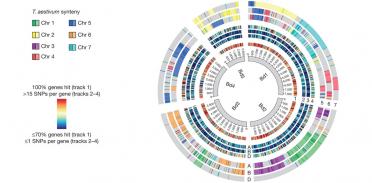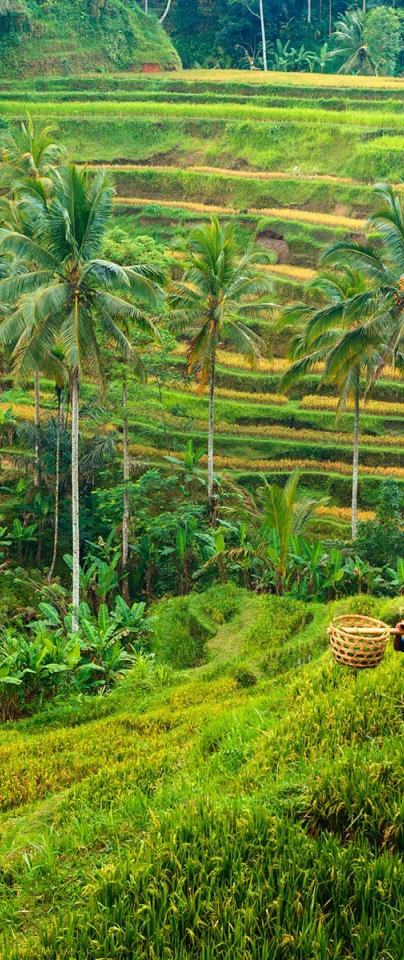Global food security
Our wide-ranging research into animal, plant and microbial genomics helps us improve breeding, withstand disease and enhance yields for future generations.
How do we answer the most imminently approaching question of our time: how to feed 9 billion people by 2050? At the heart of this lies an intrinsic discrepancy. A continuously increasing global population must find a way to increase calorie production by 60% in three decades time, while crop yields that once soared above this rise have begun to plateau. We aim to help solve this multi-faceted problem with a far ranging and holistic approach to improving food security.
A global picture is emerging that has outpaced our ability to come to terms with it. We already, as of 2012, have over 800 million undernourished people worldwide. Sea levels are rising more rapidly than anticipated, while our arable land is being quickly degraded. Desertification and salinity wreak havoc on our soils, which after decades of intensive farming have been rendered less fertile through loss of valuable nutrients. Rainforest decline and environmental destruction mean we are losing species at mass-extinction rates – biodiversity that we directly rely on in order to produce our food. We have become overly reliant on monocultures of our most important crop species, which lack the natural diversity required to withstand the effects of pests and disease. Overuse of antibiotics in our livestock renders our current antibiotics ineffective at best, and perhaps useless. Meanwhile, from California to India, through excessive irrigation, fossil aquifers are almost exhausted and fresh water is becoming one of our rarest commodities.
Not limited to the land - overfishing, rising temperatures, ocean acidification, human pollution and agricultural runoff are starving our seas of oxygen and life. Up to one-third of fish stocks, relied upon by billions, are currently over-exploited. By 2050, our entire stock is expected to collapse entirely.
We face a problem that has been overcome in the past. Norman Borlaug’s Green Revolution of the mid-20th Century prevented a looming global famine through seminal work with the wheat genome. Yet the associated, pioneering crop breeding techniques, tied to ever-increasing production, are veering toward an impasse. How can modern research, combining next generation sequencing, scientific computing and big-data analysis, aid us in averting a catastrophe?


Our collaborations include both local farmers as well as researchers spanning six continents, allowing us to expand our impact on an international scale.

In order to answer these pressing questions, we are exploring the breadth of biological solutions to the global food crisis - focusing not only on crops and livestock but on the pathogens and pests that infect and destroy them. We research how natural variation can be reclaimed from the wild ancestors and relatives of our most important crop species. Our cutting edge software helps crop breeders to better select for beneficial traits in diverse species essential for food, more sustainable biofuels, fallow for fields and grazing for livestock. We investigate alternative methods to aid us in detecting and responding to pathogens in the field, while using advanced techniques to closely monitor crop growth in real time, which can reduce the use of chemicals and increase crop yields.
We not only search for answers to questions directly pertaining to food security but also to intrinsically linked environmental issues. By exploring the mechanisms by which bacteria can acquire antibiotic resistance we can attempt to relate these to animal husbandry practices. Through monitoring the health of our oceans, soils and pollinators we can better understand the deleterious effects of chemical pollution and climate change on primary production and the ecosystems that we rely on in order to produce our food.
Advanced open access tools developed by our bioinformaticians help the international scientific community to better analyse and investigate findings in an era of big-data bioscience research, while being at the forefront in developing high-throughput genome sequencing using the latest in supercomputing technology.
We provide real-world solutions to global issues. Our research can be applied to fields, farms and industries from Norfolk to Vietnam, with high-tech and sustainable outcomes to increase yields, prevent losses and sustain environmental health and biological diversity.

1 in 7 people worldwide are undernourished

World food production will need to increase 60% by 2050

40% of losses from the six key crop species come from plant disease

40% of the world's arable land is degraded to some degree and will be further affected by climate change
Our collaborations include both local farmers and researchers spanning six continents, allowing us to expand our impact on an international scale, using on-field, real-time genotyping and phenotyping techniques that can be applied globally. Furthermore, we are committed to training the next generation of bioinformaticians, with our workshops and courses attracting hundreds of researchers from over 40 countries and every continent.
We are tackling issues that affect not only UK agriculture but have a significant impact around the world. Research into the dispersal, detection and prevention of wheat yellow rust will help to alleviate global annual losses of around 6 million metric tonnes. Analysis of the green peach aphid, which colonises over 400 plant species representing 50 families and is resistant to every known pesticide, will shed light on how to tackle this important pest.
Investigating viruses such as swine flu, which in the EU alone causes economic losses amounting to a total cost of over €1billion per year, will aid in the production of a novel vaccine to prevent the disease from spreading. The identification of novel markers in Miscanthus and Brachiaria species could help us produce more sustainable biofuels and allow us to grow aluminium and salt-resistant grasses in Africa.
At both UK and global level, EI’s work is supporting ongoing annual increases in wheat productivity and reduced impact of disease outbreaks. We estimate EI’s impact at £63m to the UK economy and £2.7bn to the rest of the world over the next 25 years.
EI has also been part of setting up a National Aquaculture Development Centre in Tanzania with the aim of doubling aquaculture production by 2025. EI’s work will enhance capacity in research and identification of strains of tilapia within Tanzania, through participation of local staff and research students in our fieldwork and workshops and through preparation of a field guide to the cichlids of Tanzania. This could be worth an additional $12.4m, but more importantly this has the potential to improve food security for some of the world’s poorest people whilst preserving natural biodiversity. We estimate EI’s impact at £612m over the next 25 years.
EI is at the forefront of international research efforts to improve wheat productivity to meet the needs of a growing world population in the context of climate change. Our work is already being used by plant biotechnology companies, wheat breeders and wheat researchers, forming the basis for international breeding programmes.
We were instrumental in the assembly and annotation of the wheat genome, contributing to each and every breakthrough using our genome sequencing capacity and bioinfortmatics tools developed on site. The wheat genome has become a vital tool for UK and international wheat breeders and is already impacting on yield and quality of commercial varieties. We are one of eight institutions in the Designing Future Wheat (DFW) Programme, aiming to develop new germplasm with the traits needed by plant breeders to develop new wheat varieties.
Research highlights include using mutant databases to study reverse genetics in wheat, the evolution of plant immunity, the identification of wheat genes that increase disease resistance and applying sequencing to the surveillance of plant pathogens. Our varied research groups play a vital role in exploring the functional genomics of aphid adaptation to plant defences, modelling resistance to late blight in potatoes, developing tools for the analysis of small RNA regulatory networks in plants, understanding the pathogenesis of swine flu in pigs, as well as collaborating with various institutes in order to establish novel infrastructure platforms for data and software dissemination.

Our platform and pipelines group has access to cutting edge, complementary technologies that, alongside our scientific computing capacity, have ushered us into a pan-genomic era. Using our current platform of Illumina HiSeqs we are able to sequence an entire wheat genome in less than a week - it is now possible for us to investigate multiple varieties of multiple plants in order to assist targeted breeding. In our lifetime, we have sequenced the equivalent of 575 wheat genomes, 1245 barley genomes and 1325 rice genomes.Using portable, rapid response sequencing technology such as the MinION, we can now apply genotyping directly in fields, with a sample-to-sequence time of under four hours.
Our recent release of the most accurate, quality and up-to-date wheat genome would not have been possible without the development of the Grassroot Genomics platform. Along with specialist high-performance storage technology such as our unique SGI UV large shared memory system, handling huge datasets generated from our sequencing machines, we can assemble a complex, highly repetitive genome such as wheat in less than four weeks.
Dedicated to enabling collaborations on an international scale, we are working closely with a number of institutes in the EU and beyond in order to foster open science networks. Highlight projects include the development of the Collaborative Open Plant Omics (COPO) framework and the Wheat Information System (WheatIS). With BBSRC funding we are also helping to extend the CyVerse Collaborative as an international collaboration through building the UK’s only CyVerse node in Norwich.
We are at the forefront of implementing Internet of Things (IoT) technologies and their applications in plant phenotyping. CropQuant provides an automated and cost-effective crop monitoring and analysis platform for breeding, farming and crop research. SeedGerm can routinely screen commercial seed lots enabling quantification of seed germination frequency and seed vigour, which can be used by seed companies, growers, insurance companies, or regulatory agencies to ensure the quality of seeds. AirSurf is a cost-effective and automated field surveillance software solution to enable large-scale crop monitoring and trait analysis based on data captured by UAVs and light aircraft.


Improving food security has a profound effect on quality of life, for people all over the world.

Credit: Yavuz Sariyildiz / Shutterstock.com